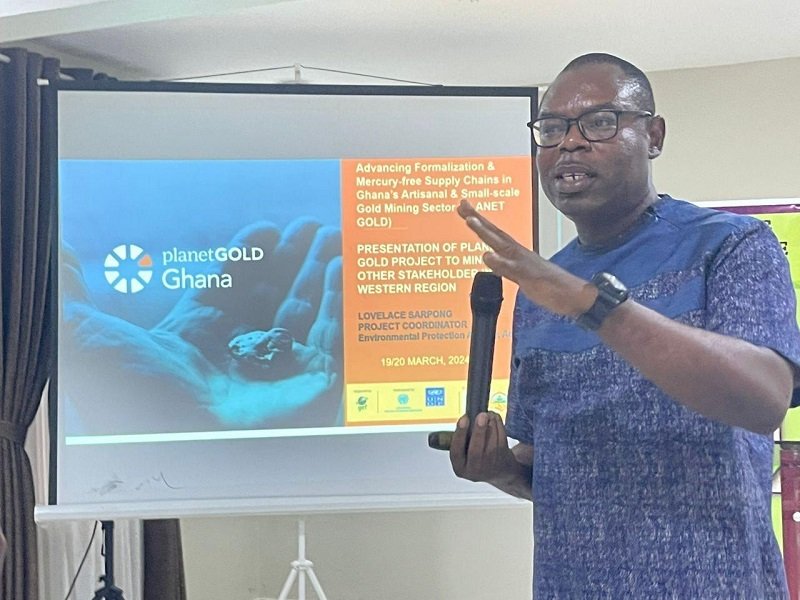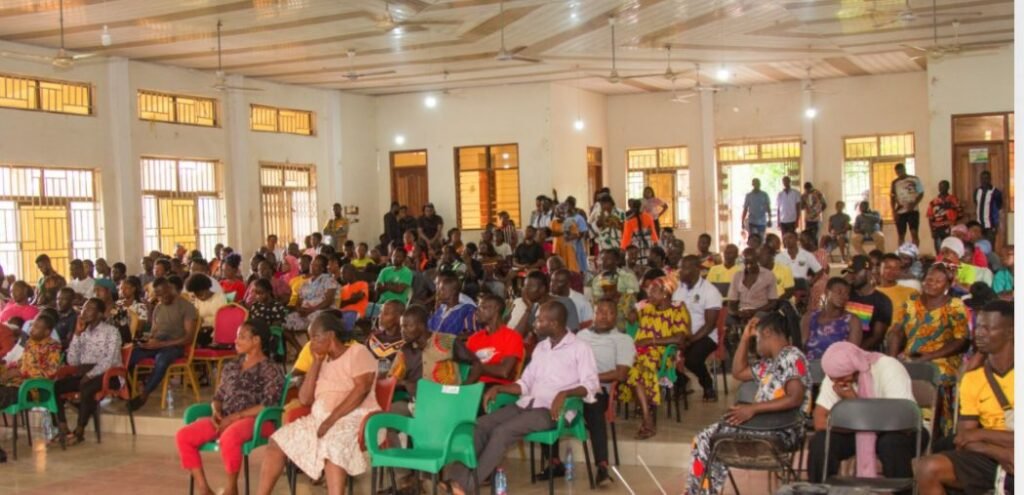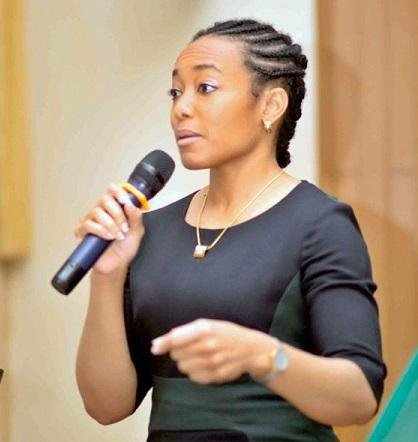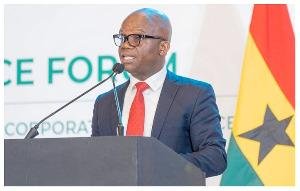Hot!
Small-scale miners schooled on health hazards of mining with mercury

Mr Lovelace Sarpong (right) addressing the participants
Some Artisanal and Small-Scale Miners in the Ashanti and Central regions have been sensitised on the potential health dangers humans are exposed to with the use of mercury in gold processing.
The sensitisation which was organised by PlanetGOLD Ghana project was to raise awareness about the negative impacts on the use of mercury in mining activities.
According to the PlanetGOLD Ghana Project Coordinator, Mr Lovelace Sarpong, the use of mercury in artisanal small-scale mining pose health challenges that affects the nervous, digestive and immune systems, lungs and kidneys; and may be fatal.
Some Metropolitan, Municipal, and District Assemblies (MMDAs) that benefited from the exercise were Amansie Central, Asante Akim North, Amansie South, Amansie West, Bekwai, and Adansi North in the Ashanti Region, and Upper Denkyira East (Dunkwa-on-Offin) and Upper Denkyira West (Diaso) in the Central Region.
Additionally, he said inorganic salts of mercury were corrosive to the skin, eyes and gastrointestinal tract, and may induce kidney toxicity if ingested.
He stated that the PlanetGOLD Project has conducted several initiatives to raise awareness on reducing mercury exposure among artisanal and small-scale gold mining actors in the country.
It was to promote mercury-free mining practices in line with Ghana’s obligations under the Minamata Convention on Mercury, support the formalisation of the ASGM sector while advocating the adoption of the CRAFT Code and responsible supply chains, and raise awareness on the availability of mercury-free alternatives.
The Environmental Protection Agency (EPA) Area Head for Konongo, Mr Dawood Abbas, underscored the importance of government’s environmental regulations and EPA’s role in ensuring compliance within the ASGM sector.
He encouraged miners to prioritise environmental stewardship to gain community trust and secure a Social License to Operate (SLO) and reaffirmed the Agency’s commitment to enforce its commitments under the Minamata Convention.
BY Cecilia Lagba Yada
Hot!
Ghana to locally refine its gold starting October 2025 – Sammy Gyamfi

The Chief Executive Officer of the Ghana Gold Board, Sammy Gyamfi, has announced that plans are far advanced for the establishment of a state-owned gold refinery in the country.
Speaking at the 2025 Minerals and Mining Convention, Mr Gyamfi said the refinery will process locally mined gold into bullion instead of exporting it in its raw state.
According to him, it is unacceptable that Ghana, despite being a leading gold producer in Africa, continues to export raw gold known as dore.
He explained that the Gold Board, working with the Bank of Ghana and local refineries, will from October 2025 begin refining gold locally.
He also disclosed that an ultramodern assay laboratory will be built to ensure international standards in testing gold quality.
Mr Gyamfi noted that the refinery will be wholly state-owned and will help Ghana move away from raw mineral exports to value addition.
This, he said, will boost foreign exchange earnings, create jobs, and position Ghana as a hub for gold refining and jewellery production in Africa.
The CEO stressed that the project forms part of government’s strategy to ensure the country benefits fully from its natural resources and to transform the mining sector into a driver of economic growth.
By: Jacob Aggrey
Hot!
There is strength in diversity; let’s live in peace – Zanetor Rawlings urges Ghanaians

Member of Parliament for Korle Klottey, Dr. Zanetor Agyeman-Rawlings, has urged Ghanaians, especially the youth, to value the peace the country enjoys and to see diversity as a source of strength.
Speaking at the National Youth Conference held at the Pentecost Convention Centre under the theme “Igniting Potential; Inspiring Change”, she warned against being lured into conflicts and divisions fueled by reckless statements from politicians, traditional leaders, religious figures, or academics.
According to her, many young people have no idea what it means to live in a country torn apart by war, and therefore must not take Ghana’s peace for granted.
She stressed that the harmony among different ethnic and regional groups should be protected at all costs, since it is peace that allows citizens to gather freely and safely.
Dr. Zanetor said Ghana’s development depends on embracing diversity and working together.
She urged the youth to tap into this strength so that Ghana would continue to shine as the “Black Star” of Africa and serve as an example for other nations.
She expressed appreciation to the participants for attending the conference and asked for God’s blessings on the country.
By: Jacob Aggrey














